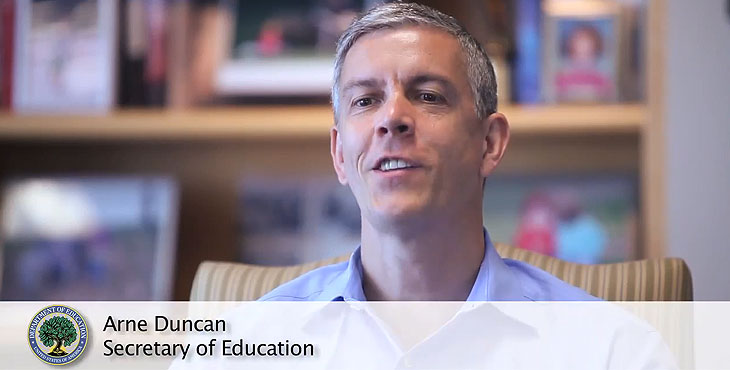How do we as a country provide supports on college campuses for veterans and ensure they have access to high-quality education at an affordable price? This question helped focus a Student Voices Session that recently took place with Secretary Duncan in Washington, D.C. The goal of the conversation was to understand the issues student veterans face, identify institutions of higher education that are providing comprehensive supports, and take action at the local, state, and federal levels.
The Obama administration is encouraging institutions to sign on to the 8 Keys to Veterans’ Success, a voluntary initiative through the Departments of Education and Veterans Affairs by which colleges and universities can support veterans as they pursue their education and employment goals. Already, over 1,000 schools have signed on to support service members in transitioning to higher education, completing their college programs, obtaining career-ready skills, and building toward long-term success.
Abby Kinch, a current Florida State University (FSU) student and former Air Force Cryptologic Linguist, spoke about FSU’s Veterans Center, which provides veterans with a one-stop shop for on-campus support and a place to enhance their development as student leaders. Many of the students in attendance were impressed by the resources available for veterans at FSU and said they would like to see them replicated in their colleges and universities.
Franchesca Rivera, a former Marine and current Art Institute of Washington student and certifying official, passionately spoke about the need for transparency with regard to the cost of college, what the GI Bill will actually cover, and what student veterans should expect to pay. Rivera mentioned that, while most schools serving veterans have a dedicated VA certifying official, the people in this position have a high level of turnover and therefore it is hard to get accurate information.
Veterans Affairs Undersecretary Allison Hickey responded that the VA partially covers the school’s reporting costs and that her office will look into how these positions are trained to ensure certifying officials have the knowledge needed to assist veterans pursuing higher education. Additionally, she notes that the VA has just released a more robust GI Bill Comparison Tool, which will help students find the best programs that fit their needs.
As the secretary was discussing follow-up opportunities, Samuel Innocent, a senior at the City College of New York, suggested that the Student Veterans of America and other student-led veterans’ chapters could create a nationwide student survey to provide tangible feedback on schools’ services for veterans, and on state and federal assistance programs. The goal of the survey would be to strengthen what works and re-tool programs that are not having desired outcomes for meeting veterans’ needs.
This session was a part of the ongoing “Student Voices” series at the Department in which students engage with senior staff members to help develop recommendations on current and future education programs and policies.
Topics in this story
More Stories
Soldiers' Angels volunteers provide compassion and dedication to service members, Veterans, caregivers and survivors.
Veterans are nearly three times more likely to own a franchise compared to non-Veterans.
The Social Security Administration is hoping to make applying for Supplemental Security Income (SSI) a whole lot easier, announcing it will start offering online, streamlined applications for some applicants.








some may call it abusing the space provided and I really don’t care. Department of Veterans Affairs has cut off access to some of the most important stories the veterans want to comment on.they thought by taking out the reply section they would stop us from voicing our opinions. That won’t work with us!instead of sending 4000 American troops to Africa to build hospitals, why don’t they use that money and those brave men and women to build more VA hospitals here in the United States? I think it is time people stop and remember a very important phrase: charity begins at home! our country is in danger of being invaded through our southern bordersand we’re building hospitals halfway across the world, let’s protect America my country!
I would love to attend a town hall meeting in Phoenix. How do I get on the invitation list?
As a Marine Corps Veteran, the father of a Soldier in Training currently, and the husband of an Army Veteran, I can tell you these subjects hit home. When I used my VocRehab benefits (I am currently rated at 40% SC), it got so confusing and red taped, I was deemed rehabbed 1/2 way through my program!! It took me an additional 15 years and 30K out of my own pocket to finish my degree. Now, degree or no degree, I am unable to work due to injuries either caused on Active Duty or related to injuries from Active Duty. My direct service connected injuries alone are degenerative in nature, however, the Phoenix VA won’t acknowledge that in 20 years, nothing has changed in my medical record? I couldn’t even use the GI Bill, though I paid into it. The reason provided to me was because it was “one program or the other.” So, how do I get a refund from the Federal Govt that removed $100 (which during my first year of service was huge!) every month for the first year of my enlistment since it did not apply to me? I cannot tell you how many VA advisors I had while I was in school. I stopped counting after 5 in a year and half. Having a more clear direction of all options, how they either don’t or do apply, what costs involved, and one Point of Contact, would have made the difference in my educational experience.
Schools should be held more accountable for the implementation of the 8 Keys!